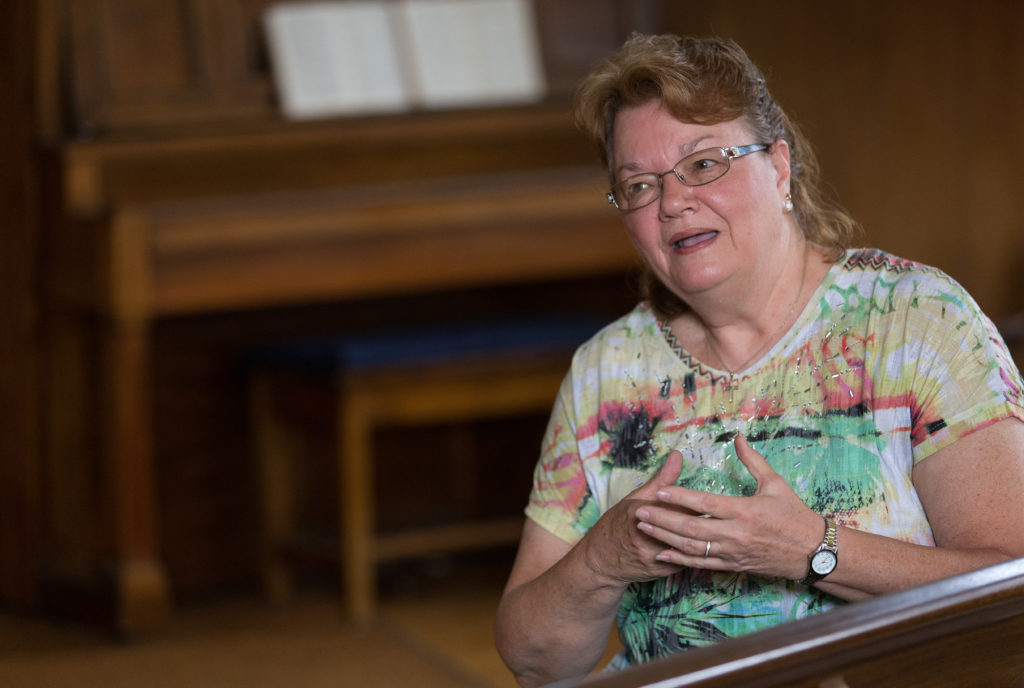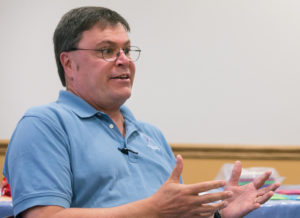Judy Pysell had no idea a column she had written had found its way to the United Methodist Association of Communicators annual awards contest. She was watching last week’s virtual gala only to support the rest of the conference’s communications team in the international competition, so when she heard her own name announced, she wasn’t sure she had heard correctly.

“It just completely took me by surprise,” Pysell said.
Pysell’s article, “The Circle of My Life, My Circle of Friends,” took third place in the non-fiction story category and was one of five UMAC awards earned by the West Virginia UMC Communications Team in this year’s contest.
The team’s other awards included “2020 Special Annual Conference” (Print Publication, 3rd Place); “Bishop Steiner Ball: Walking with Jesus, Holy Week Study” (Electronic Special Publication, 3rd Place); “30 Days of Anti Racism Social Media Campaign,” (Online Content, 3rd Place); and “Responding to the Opioid Crisis,” (Video Production Under $500, 2nd place).
“It’s an honor and privilege to work with such a committed, gifted, passionate, creative, resilient group of individuals,” said Rev. Deborah Coble, Director of Communications for the West Virginia Conference. “Everyone brings different gifts to the table, and when we get to celebrate even one person winning, it’s like all of us have won.”
Different gifts are exactly one of the points Dr. Barry Steiner Ball makes in his award-winning video presentations about how churches can respond in the opioid crisis.

“The way I talk about it is, ‘Here’s a thousand opportunities. Where is God calling you?’ ” Steiner Ball said, explaining that one church member may bring a gift for organization, another may be good with kids, “and someone else might be good at just sitting on the front porch, holding a hand and letting mama cry. … And each church has its own personality, too.”
It’s that same combination of individual giftedness and teamwork that emphasize the Wesleyan tradition of holding one another accountable in love to bring out the best in each other, as the Communications Team does, Coble said.
The opioid video series itself demonstrates how those gifts can work together. Steiner Ball explained that the series originated from a 90-minute, in-person talk he gives churches in which he explains lessons he learned about addiction and families as a candidate for his Doctor of Ministry in Military Chaplaincy and the drug enforcement administration he served in Maryland. Coble had recently videoed one of those talks.
“What Deborah did that was so wise was that she broke that 90-minute talk into three sections and encouraged me to create discussion questions to go along with it,” he said.
And it happened almost by accident. Steiner Ball was scheduled to make the presentation to an annual conference in Tennessee when Covid made it necessary to take it digital. He wasn’t able to attend that conference in person, but he was able to share the video series with it and with many other groups.
Since it went online, the video series has been used by several churches and groups within the WVUMC, many of whom have now recognized addiction as much more than a moral issue. As a result, they have adopted sober living houses, started mentoring school-aged children of addicts, and responded together with existing programs, Steiner Ball said.
Pysell’s piece, a first-person account of returning her mother’s ashes to her British homeland during a study of John Wesley in England, is also making a difference.
“I don’t think I was even asked to write about it,” Pysell said. “I was just sitting, thinking about it, and I picked up a pencil and some paper, and the words just came. I couldn’t stop them. They were flowing through me. … The Holy Spirit was moving through me to write this, and now it is helping other people get through their grief.”
Ironically, Pysell recently experienced the emotions of grief again, when her husband, Rev. Glendon Pysell, died from Covid on Jan. 23. So when she heard her name announced on March 10, she found herself re-reading the almost forgotten article.
“God works in such mysterious ways,” she said. “Here, my husband had passed away, and I was grieving his loss, but yet reading that article, coming at that time of my life, it was almost like telling me everything is going to be okay. … It was a moving thing to hear in my grief of a grief that happened a couple of years before that is now bringing me joy. …
“They say the wheels of God move in a mysterious way and a slow fashion, and he is just moving in my life every single day,” said Pysell. “That article not only helped me get through my grief, now it is helping others get through their grief.”
And that’s what the work of the WVUMC Communications Team and UMAC is all about, Coble said.
“It’s not so much about the awards,” she told the Communications Team in a recent Zoom meeting. “It’s about seeing that people are spiritually fed, and that is important. We are there to walk alongside people in their journey.”
Pysell’s article and Steiner Ball’s video series — along with the award-winning news articles printed for the 2020 Special Annual Conference, Bishop Steiner Ball’s Holy Week Study, and materials from the anti-racism social media campaign — remain available for reading and viewing at WVUMC.org.
Audrey Stanton-Smith is the Southern District Communications Coordinator. She was also part of the award-winning team that produced the 2020 Special Annual Conference Print Publication.